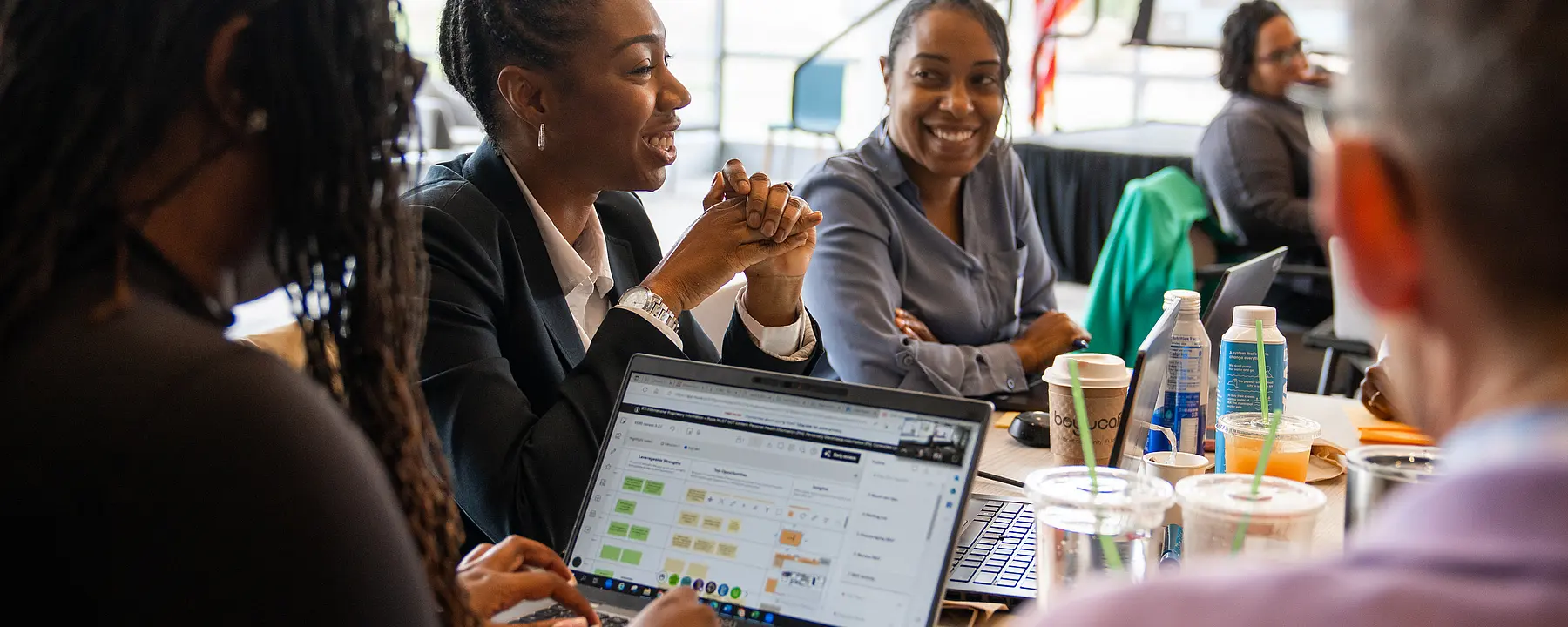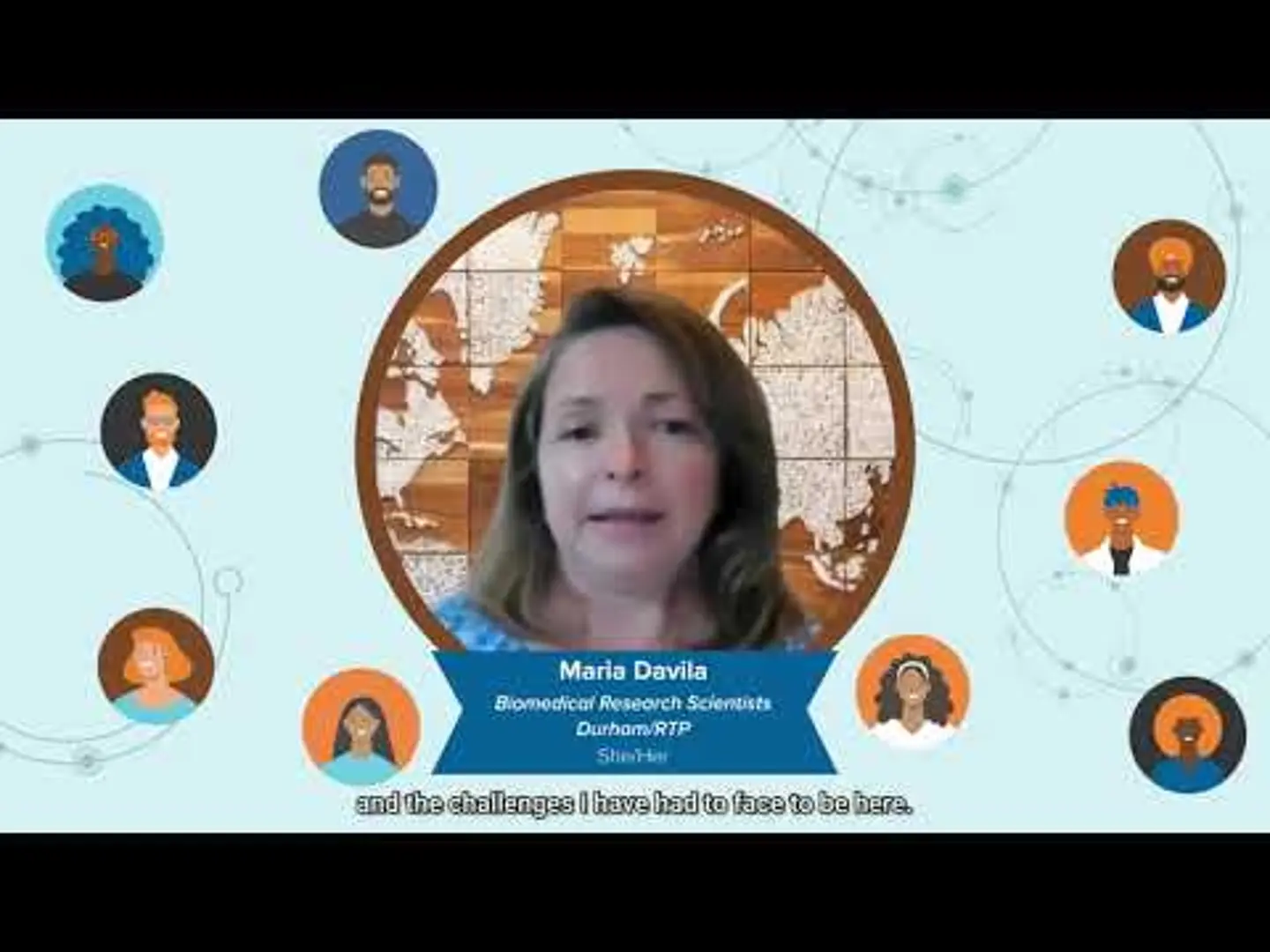Progress with a Purpose
From our research, to community involvement, to outreach, we apply our principles of Equity, Diversity, Inclusion and Belonging (EDIB) globally at every level and across every function of our organization. Our commitment to honoring these principles continues to help us create a diverse team that uses an inclusive environment as the foundation for improving the human condition. We have also turned a lens on ourselves, reaching out to our employees to ask for their views on equity, diversity, and inclusion at RTI and how they would like to see their organization grow and change to increase everyone’s sense of belonging.
Get to Know Us
Learn How Our Staff Value Equity, Diversity, Inclusion and Belonging

Vincenzo Malo
Public Health AnalystI have had the privilege to devote time and energy to helping RTI carry out our mission to improve the human condition.

Vincenzo Malo
Public Health AnalystAt RTI, I have had the privilege to devote time and energy to helping the RTI community critically think about how we carry out our mission “to improve the human condition” in the context of the continued mis- and under-representation of LGBTQIA+ individuals in research settings. As a queer-identifying researcher, this effort is of great personal importance for me, as debates about the legality of my identity permeate society, leaving many intervenable LGBTQIA+ disparities unaddressed. I hope to use this personal drive to improve the human condition by contributing to the development and implementation of inclusive research practices that meaningfully advance LGBTQIA+ equity. I feel fortunate to have been able to conduct this investigation and share these findings with my colleagues at RTI, and I look forward to continuing similar work exploring how we as a research community can strive to meaningfully improve the human condition for all individuals.

Toni Willis
Medical Editor, Health SolutionsAs an ERG, the BERG offers the opportunity for members to connect with each other across the institute.

Toni Willis
Medical Editor, Health SolutionsAs an ERG, the BERG offers the opportunity for members to connect with each other across the institute, making new connections and opening up new opportunities, both for leadership within the BERG and more broadly, through networking and educational events the BERG and our strategic partners may offer. Additionally, members can contribute to BERG initiatives through committee work and through making their own needs and suggestions for BERG events and activities to make RTI a more supportive workplace for Black employees.

Megan Comfort
Senior RTI Fellow, Transformative Research Unit for Equity (TRUE)Through the JustResearch Scholars program, RTI will create an innovative model for advancing science.

Megan Comfort
Senior RTI Fellow, Transformative Research Unit for Equity (TRUE)My workplan for my Fellow appointment focuses on creating the JustResearch Scholars program, which will meaningfully enhance RTI’s capacity to conduct culturally relevant, equity-focused, anti-racist research by building a talent pipeline for people who have been incarcerated and who want to pursue research careers. One of the most impactful, immediate ways an organization can actively work against systemic oppression is to intentionally hire, mentor and promote people who have a history of involvement with the criminal legal system. Through the JustResearch Scholars program, RTI will create an innovative model for advancing science by providing meaningful professional opportunities for researchers with deep experience of the systems they study, who will become leaders in transforming science-informed responses to poverty, homelessness, violence, health inequities, injustice, and other forms of oppression.

Kristina Brunelle
Senior Director of Global Diversity, Equity, Inclusion, and BelongingWe see equity tangibly in our work in the way we hire people.

Kristina Brunelle
Senior Director of Global Diversity, Equity, Inclusion, and BelongingWe see equity tangibly in our work in the way we hire people and the way we determine if someone deserves a promotion or not. Both of them are based on whether somebody has the capabilities and skills to be hired or to be promoted.
If I am not using objective competencies upon which to evaluate them if I'm just sort of making it up as I go along with a very subjective set of criteria, then I'm not going to be practicing equity. But if I look at an objective list of the the skills that I need for this hire and I compare all the candidates against those objective competencies and then choose based on who's the most excellent or the best at those, then now I'm making an equitable decision.

Cara Valentino
Director of Racial Justice and EquityIn the last three years, RTI has made a dedicated effort to enhance the workplace equity and outcomes of Black staff.

Cara Valentino
Director of Racial Justice and EquityIn the last three years, RTI has made a dedicated effort to enhance the workplace equity and outcomes of Black staff. In the process the benefits have extended to not only other people of color but all our Employee Resource Groups, and all people of RTI. This work is a long-term commitment the entire institute, and I am thankful that our Executive Leadership Team is in strong support of the work of racial justice and equity. I am excited and inspired to see that the benefits of racial justice work, and equity continue to create benefits for our Black staff, all people of color, and all populations that are represented within our diverse international workforce. Together at RTI we are working toward a better tomorrow, and one in which RTI continues its journey to becoming a truly equitable workplace for all.
Snapshots of our EDIB Progress
In 2022, RTI launched the Transformative Research Unit for Equity (TRUE), a new unit of interdisciplinary experts focused on the design and implementation of equity-centered and culturally responsive research practices, and trusted partnerships with marginalized communities.
“Equity exists when the intersections of your social identities, residence in marginalized communities, and experience with oppressive systems do not determine your opportunities, access to resources, and outcomes in life,” said RTI clinician and researcher Dr. Stephanie Hawkins, founding director of the new unit. “My colleagues and I are passionate about the role of research in making systems more just. Through TRUE, we will develop impactful solutions to some of the most important challenges of our time.”
TRUE will have three focus areas:
Equity Capacity Building Hub: A hub that trains and consults with researchers, provides holistic mentorship to emerging scholars, and builds partnerships with the community to transform inequitable systems by using equity-centered and culturally responsive research practices.
Social and Economic Justice Collaborative: An interdisciplinary team of scientists that builds an evidence base of impactful interventions to transform oppressive and inequitable systems, policies, programs, and practices through strategic consultation, research, evaluation, and training/technical assistance.
Narrative Research and Community Engagement Lab: A lab that studies the dominant narratives impacting marginalized communities and engages these communities in the research, co-creation, and multi-platform dissemination of new narratives that offer solutions and inform race, social, and economic justice policy and practice.
In 2022, RTI launched a new structured interviewing and hiring process borne out of the ELT commitments, the Racial Equity Survey of U.S. staff, and the Peoplism assessment of our talent acquisition and talent management practices. It is one of many changes RTI has made over the past two years, in alignment with our mission and values, to help transform the institute into a truly equitable workplace. The new process is part of the EDIB roadmap, which RTI has implemented and is measuring through FY24.
This process has been finalized and launched (October 2022), and will:
- Support increased clarity around the critical success factors for candidates
- Ensure each candidate experiences the same interview questions
- Provide clear evaluation factors, scoring, and documentation around the decision process
“I can’t tell you how many people I’ve interviewed over my 39 years at RTI. It’s a lot. What I can tell you, because I’ve been part of the pilot process for this new approach, is that this new process is far superior. Not only is it more applicant friendly, I believe it has addressed many of the issues that Peoplism identified as ways in which conscious and unconscious bias enters into the interviewing and hiring process.” – RTI President Tim Gabel
As part of RTI’s SupplierDEI initiative, RTI’s Global Real Estate Office in 2022 hosted its inaugural Black Vendor Fair. More than 150 representatives from small businesses across North Carolina, as well as RTI staff, attended the event.
Attendees were invited to explore a hall of opportunity where RTI FSS leaders discussed ways they can grow with RTI. Partners of the institute, the NC HUB Office and Women’s Center, the Greater Durham Black Chamber of Commerce, and The National Institute for Minority Economic Development also attended to extend knowledge and potential opportunities.
This effort was the result of the hard work that has been achieved through the SupplierDEI initiative and cross-functional teams at RTI to shift the way we partner with diverse-owned businesses and promote economic opportunities for Black-owned businesses.
Small businesses were encouraged to register on the SupplierGATEWAY portal for opportunities at RTI, and 72 new businesses registered in the portal. Staff are also encouraged to search through SupplierGATEWAY for prospective Black-owned business partners and to identify subcontracting possibilities.
In 2020, RTI introduced a new Lead Forward behavior, Engage Inclusively.
At RTI, Engage Inclusively means: Value the unique background, personal qualities, and characteristics of every employee, and fully engage diverse groups of individuals for smarter ideation and decision making.
In 2021 staff were invited to increase their ability to Engage Inclusively via a goal in each employee’s professional development plan. We have continued to expand the Engage Inclusively goal by adding new resources to help staff fulfill the goal, improving resources for international staff, and prioritizing Racial Justice and Equity education for U.S.-based people managers.




